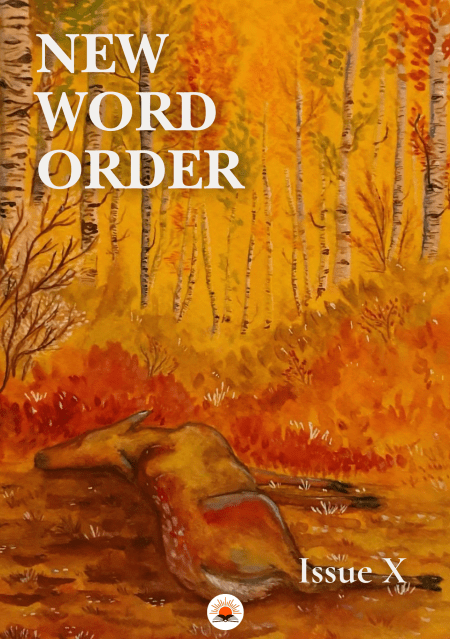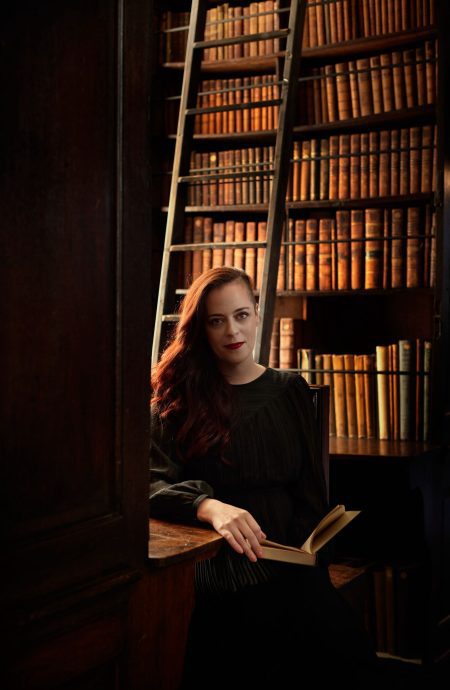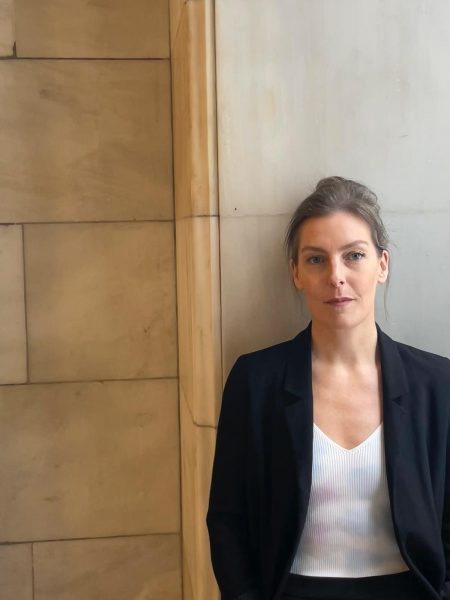by Emma Mooney, she/her
Things to write stories about. So far, I had thought of seven- hasty scribbles on the page read guilt, love, school, parents, abuse, money, and sex. That was supposed to be the easy part, yet it had taken me longer than I had hoped to even come up with them. Outside the tall window on my right, the sun was starting to go down, and I could tell it was going to be one of those long summer sunsets that turned the sky pink. The room was already beginning to glow with the colour of evening. On the floor was an ornate red rug―from Turkey, originally, I think― and there was a slash of bright colour across the mirror on the mantelpiece.
This had always been the best room for writing. ‘The front room,’ my Mother used to call it, although she never went in there. She preferred the view of the back garden from the living room, where she would sit in purple slippers and refill her tea from the good China teapot. The front room was always my father’s, where he would entertain in his old-fashioned way, taking thick glasses down from the shelf and producing imported cigars or whiskey. When he wasn’t entertaining, my father sat for hours by himself. Doing what, I never knew. At times like that my mother would stop whatever it was she was doing and put an arm around me. She would lead me anywhere that wasn’t the front room, although I liked her bed most especially. I wasn’t allowed to go there except on rare occasions, and if I was lucky, she let me fall asleep there. I often woke to find myself alone the next morning. Later in life, I came to realise that on these nights my father had not joined us at all.
Their portraits hung either side of the fireplace now, and next to the front door. My Mother, I’m sure, had been told not to smile, so stared blankly from the frame. My Father, next to her, held the same dark expression he always had, and took up far more of his frame than my Mother did of hers. I glanced at them now, then back at the paper. I picked up my pen and stared at the same seven words that had been occupying me for the past hour.
Sex. There were plenty of things to say about sex, but even as I thought that, another notion occurred―I wasn’t trying to say something, I was trying to tell something. There were endless columns in the newspaper where people said things. A writer does not give his opinions, I thought quite savagely. A writer tells a story. And there were no new stories about sex. Not that I could think of. It had been written on extensively― Lolita, Lady Chatterley’s Lover, they had all been done. “The libraries of the world have yawned themselves to sleep over your kind.’’
My eyes wandered to the Bukowski book on the shelf, so dog- eared and thumbed through that the spine was beginning to rip. One could barely see the label marking page 447, “So you want to be a writer?’’
I used to pore over it, time and again, feeling helpless under the words of the great writer. It was marked years ago as one of the most inspiring works I ever read, but recently it made me feel smaller and more desperate than ever. Now my eyes stayed transfixed on it, wedged in between the Oxford Book of Irish Verse and Willa Cather’s My Antonia. The shelves were filled with endless literature from around the world- I had briefly thought, when I inherited the house, of turning the room into a library and nothing else. I still toyed with the idea every now and then, but the mahogany desk which took up most of the room was far too heavy to move alone, and the idea of hiring movers did not bear thinking about. They were much too expensive these days, now that they worked for companies and not door to door. Besides, there were bottles of scotch and bourbon that hadn’t been moved since before my Father’s death, and they hardly belonged in a library. A study, yes, but not a library.
There was a cut out in one of the wooden shelves, an evenly shaped box with a mirrored panel at the back, containing most of the fine liquor my father had accumulated over the years. I suppose he thought it would be sophisticated to hide his habits in books. Amongst the high shelves which ran from the floor to the ceiling, there were any number of books; hardcover, paperback, many without covers and more without spines. When this was strictly father’s room, the books had been in perfect condition- leather spined, with gold lettering on the important ones, such as his Narnia collection. He never read them. The room had fallen into disrepair since I moved in; piles of books slowly collected themselves around the room, first in corners, now anywhere there was space. A cork noticeboard rested beside the fireplace, with newspaper clippings tacked next to countless phone numbers of publishers, magazine editors, newspaper companies. I could imagine my father’s reaction if he was to see the room. At least if his whiskey is here, the room retains some sense of the elegance it had when it was his.
Although, I thought, with a quick glance down at my glass, and an even quicker glance up at the matching set on the mantelpiece, (which had been a set of three when I came in), there wasn’t nearly as much to drink as there had been years ago.
Pushing back the chair which was beginning to give me an ache in my lower back, I reminded myself―I could have a drink once the list of subjects was finished. There were five bottles in the mirrored panel, or ‘the box,’ as I had come to call it. A large bottle of Bourbon, a smaller, more detailed bottle of Talisker Skye, two bottles of Jameson and a Welsh Malt Whiskey which I had tasted only once in my life and did not care for. I refilled my glass from the Jameson bottle; they were the least empty and the least expensive. After a successful day of writing, I could reward myself with one of the finer, more sparse ones, I promised, turning away from the box.
But I had done nothing. With a bitter glance at the portrait of my Father, who seemed to be aware, even in his oily frame, of my procrastination, I sat back down and pulled myself tighter than before to the desk. I stared at the seven words again―parents, money, sex, abuse, love, school, guilt. They were a good start; there were endless combinations of them which could be used to make a story if only I could think. But I could not. A cigarette might help, although I cursed the idea of the tortured writer scribbling feverishly in a dark room, puffing away on a cheap cigarette to fill the time. I let out a chuckle- my cigarettes were the more expensive kind. Did that make it alright? I wondered as I fumbled for the packet and reached for the lighter. I was sure it did.
Once there was a substantial amount of smoke clouding the desk, I stared at the page again. There were still only seven words, the same seven I had been tossing about in my mind for what felt like hours. Picking up the pen, I scanned them once more before circling a word- parents. Parents were always a good place to start when it came to writing; they presented a family framework, sometimes even a main character and if nothing else, one could always draw on personal experience.
Personal experience.
My eyes wandered to the portraits of my Mother and Father again, lingering on the face of my Mother, so unusually solemn in her picture.
What experiences had she given me that I could write about? She had given birth to me, raised me, supported me financially and then died. Isn’t that what all parents did? Unless one was to have a particularly interesting parent, was there actually all that much to write about? I began to rethink my topic choice. The cigarette burned low in my hand and I leaned back, taking a desperately long drag before tilting forward again, with what I hoped was a fresh perspective. A quick drink. A new word.
Scribbling a line through parents, I concentrated on guilt. I leaned closer to the paper and felt for the ashtray, managing to finally stub out the cigarette with eyes still on the page. Guilt makes people anxious, I scrawled, guilt makes people want to help other people, makes people feel shame, makes people nervous and makes them try harder- was guilt a positive or negative thing? It made people lay blame on themselves and others. Guilt ate people up. What else did it do? What did it do that I could write about? Disregarding the idea to draw on personal experience, I tried to create something new in my mind. A new person, someone real, consumed with guilt. The obvious questions sprang to mind―why were they guilty? Who were they, what had they done?
Time passed faster when I wrote- glancing up, I realised that the room had faded into a warm, dusky light, and the slash that had decorated the mirror was now stretching across the ground and onto the far bookshelf. Checking the page again, I could make paragraphs of ideas, all surrounding guilt. With a satisfied smile, I stood for a moment, stretching, before I reached for my empty glass and made my way to the box. The first bottle of Jameson was almost gone- they were the ones I most frequently replaced. I opened the fresh bottle and poured another glass, downing it to celebrate my progress. A full page! Of ideas, not mindless writing. Ideas!
Pulling myself closer to the desk once again, I closed all other books on the table- a thesaurus, a battered old dictionary from my school days, one of the many Atlases of Europe which I kept for inspiration. I had my inspiration now, nothing else need stay open. They would only distract me.
I scanned the half page of ideas. Guilt- actions as a result of guilt, actions before guilt, things people feel guilty about- murder, adultery, dishonesty, disloyalty all seemed obvious. I had drawn crooked arrows from names to things I thought perhaps linked- disloyalty, a woman who was unfaithful to her husband and struggled to deal with it, or perhaps someone driven to suicide who’s family felt responsible- could these stories be linked? The arrow I did not remember drawing suggested that they could be.
But the more I looked, the less clear it all became. It began to look more contrived on the page, the scenarios tired, the characters aged and cliché. It had been done before, or if it had not, there was a reason. And one thing more than any did not sit well with me- these were not happy stories. Murder, suicide, disloyalty. Perhaps guilt was not such a good starting point for a story which was not morbidly depressing, and that was what I’d been hoping for. Far too many stories were dispirited tales of loss, grief, an obstacle failed to be overcome. Another such story did not bear writing, and so with a frustrated sigh I ripped the piece of paper out of the notebook and got up to pin it brutishly on top of a pile of similar papers on the cork board.
After that I remained standing; I swirled the Jameson in my hand. When I looked out the window in some desperate attempt at finding inspiration, I saw that the night had darkened- across the street, only the chimneys were tinged with red, and the street had faded to a dull grey. It looked warm out. It looked quiet as well; I watched the street below for some time, and only one woman passed.
She was a tall, elegant woman walking a King Charles, one of those dogs that looked as though it was grinning at something but wouldn’t say what. It’s pink tongue trailed down past a black leather collar. Perhaps that would inspire me, I thought, feeling a new wave of excitement wash away my previous frustrations. Characters, perhaps, characters, would lead me somewhere. I drank the glass of Jameson in a gulp, for anything to give me some sort of energy, then proceeded to pour myself another quick glass, to act as my reward system.
I set about describing the woman from the street, even going so far as to choose a name for her smiling dog- Sawyer, like Tom, because she, I decided, adored Mark Twain. It soon became easy- the woman came to life before my eyes, long after I had forgotten what she really looked like. She loved her dog more than her husband- and then suddenly I stopped. Too far. My brow furrowed involuntarily. I knew nothing of this woman. I wanted to know nothing of this woman- my own small group of colleagues were often too much as it was.
It felt wrong, suddenly. Scary, almost. My eyes stung horribly. I looked around the room to allow them a shift back into focus, but instead ended up looking at my mother’s portrait again. If I knew there had been a man writing a character chart of my mother through a window, the thought would have made my stomach turn. Defeated again and more frustrated than ever, I flipped back to the seven words of my list, now whittled cleanly down to four.
Not sex. Not guilt. Not parents. School, perhaps? A fond school memory would make a happy story, but I found it hard to concentrate on the list long enough to read the rest of it. My hands began to itch for the thick glass just out of my reach on the table. The smell of it was strong, and I felt dizzy as I stared at the amber liquor. I knew that I would not focus until I had it, and so picked up both my pen and the glass at the same time. One idea, one sip. School.
Having abandoned the idea to draw on personal experience, I wrote instead about school. Friends, subjects, teachers, childhood, any books that I had read at that time (there were many). Once I had filled a substantial amount of the page, I took a quick sip before continuing. Uniforms, shoes, weather, Christmas, school holidays, school supplies. Another sip; I was getting excited now. Walls, classrooms, bus journeys, teachers- had I said that already? – playgrounds, schoolyard games. Another sip; I could feel the whiskey go from my mouth and burn down my stomach, warming everything on the way. I was writing feverishly and by my next sip I had scrawled words and ideas across five pages. When I looked up, it was dark outside.
The street was blank. Not quiet or dusky, only empty. Below my window beside the front steps, I could just about make out the white petals of the cherry blossom tree, but the rest of the world was black. I was beginning to understand how my Father had passed so many hours in the front room. My glass was empty. I blinked slowly and flipped back to the start of my pages on school. I had managed a small opening paragraph which I was sure had been engaging, but when I read over it, my left hand began to tremble.
My jaw clenched. The words were good, I was sure of that much. The sentences were well structured and descriptive, but they meant nothing. New thoughts flooded my mind- a publisher would not bother with this. They would read a line, maybe two, and discard it. My Father still stared at me from his place on the wall- he would have done the same thing. It was good work, of course, anyone was capable of good work, but was it enough?
I doubted it.
Good enough for me, perhaps, but not for anyone else, and once again I was swept up in the despair of writing.
Mere minutes passed before I tore my eyes from the page. They continued to sting. It was dark even inside now, and the room was gloomy. Closing the notebook, I scraped my chair back across the hardwood floor and placed my pen carefully in the jar where I kept my writing tools. I made my way to the box, only this time I stopped.
Not far from the portraits of my parents, a little over halfway to the top of the shelf, was the dog- eared paperback I had read so many times. I pulled it from its place and went slowly to the box, feeling deflated. My body felt as though I had been trudging through the desert- everything was slow.
But, I told myself, there was always tomorrow. Tomorrow would be better. I uncorked the clear bottle of Talisker Skye.
I poured a full glass.
I scanned the books’ markers and found page 447.
I downed the drink.
Bukowski stared back at me.
“So you want to be a writer?’’


